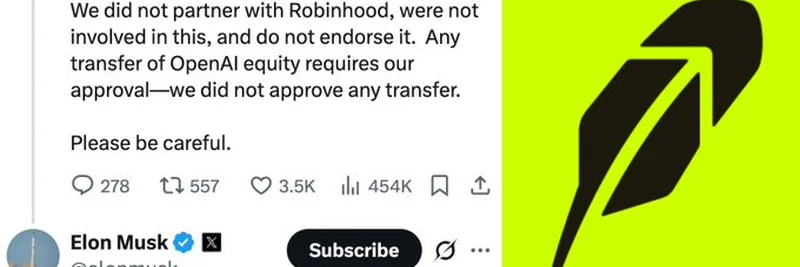Hey there, meme token enthusiasts! If you’ve been keeping an eye on the crypto world, you’ve probably seen the latest buzz on X. On July 2, 2025, DEGEN NEWS dropped a bombshell: Elon Musk fired off a sharp rebuke at OpenAI, calling their "equity" fake. This came right after OpenAI itself warned investors about unauthorized "OpenAI tokens" being pushed by Robinhood. Let’s break this down and see what it means for the meme token scene and blockchain practitioners like you!
What’s Going On?
The drama kicked off when Robinhood, the popular trading platform, introduced tokens claiming to represent OpenAI equity. These tokens were meant to give investors a slice of OpenAI’s valuation, even though the company is still transitioning from a nonprofit to a for-profit structure. However, OpenAI quickly stepped in with a statement saying, “These ‘OpenAI tokens’ are not OpenAI equity. We did not partner with Robinhood, were not involved in this, and do not endorse it.” They also clarified that any transfer of their equity needs their approval—which they didn’t give.
Enter Elon Musk, the Tesla and xAI mogul, who didn’t hold back. With a simple “Your ‘equity’ is fake” reply, he amplified the controversy. Given his history with OpenAI (he co-founded it before leaving) and his rivalry with its CEO Sam Altman, this jab isn’t surprising. The tweet, shared by DEGEN NEWS, has already racked up 3.5K likes and 454K impressions, showing how much attention this saga is getting.
Why Does This Matter for Meme Tokens?
For those of us in the meme token and blockchain space, this situation is a wake-up call. Meme tokens thrive on hype and community trust, but this incident highlights the risks of unauthorized tokenization. Here’s why it’s relevant:
- Trust is Everything: OpenAI’s swift denial shows how critical it is for projects to control their brand. If a meme token launches without the original project’s blessing, it could tank its credibility—just like these Robinhood tokens.
- Regulatory Red Flags: Unauthorized tokens can attract scrutiny from regulators. Blockchain practitioners need to stay ahead of the curve to avoid legal headaches.
- Opportunity Knocks: This could spark a trend where legit projects tokenize their assets with proper authorization, opening new doors for meme token innovation.
The Bigger Picture
This isn’t just a one-off spat. Robinhood has been pushing into tokenized equities, recently launching tokens for over 200 U.S. stocks and even eyeing private companies like OpenAI and Musk’s SpaceX. The idea is to blend traditional finance with crypto-style trading, offering 24/5 access. But when a major player like OpenAI calls foul, it raises questions about the future of tokenization.
For meme token fans, this is a chance to learn. Projects like Dogecoin or Shiba Inu built their success on community-driven hype, but they also had clear origins. Unauthorized tokens risk confusing investors and diluting value—something to watch out for in the wild world of meme coins.
What’s Next?
As of now, OpenAI is urging caution, and Musk’s comment has fueled the fire. The crypto community is buzzing, with some seeing this as a lesson in due diligence. If you’re a blockchain practitioner, keep an eye on how this plays out. Will Robinhood pivot? Will OpenAI sue? Or could this lead to a new wave of regulated meme token launches?
At Meme Insider, we’re tracking this story closely. Stay tuned for updates, and dive into our knowledge base to sharpen your skills in navigating the meme token landscape. Got thoughts on this drama? Drop them in the comments—we’d love to hear from you!



